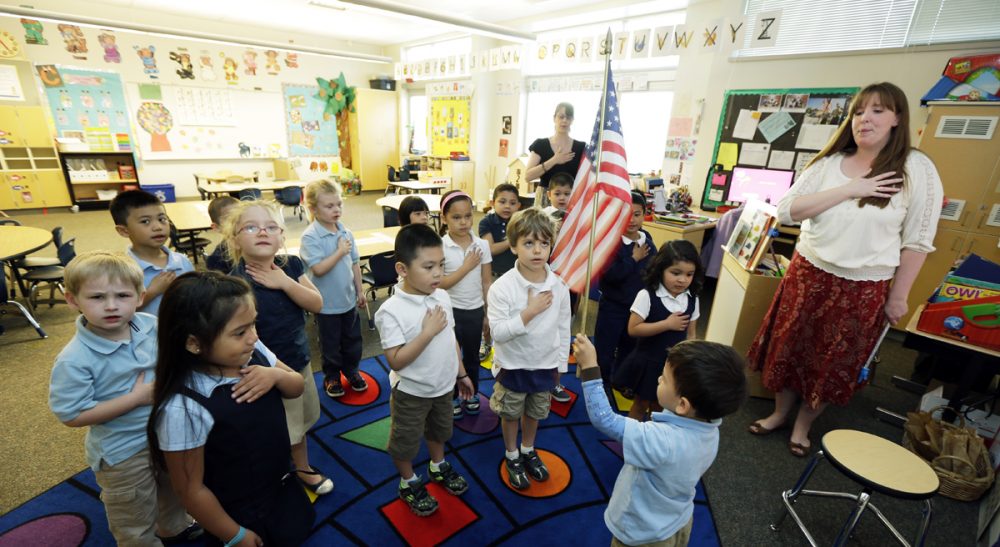Advertisement
A Child Recites The Pledge Of Allegiance. A Mother Struggles To Explain It.

My 4-year-old daughter recited the Pledge of Allegiance to me the other night during bath-time. She often recites nursery rhymes and songs she learns at pre-school at random, but hearing her say, “I pledge allegiance, to the flag, of the United States of America,” as I was shampooing her long tresses caught me off guard. The pledge seems so heavy for someone so young. “And to the Republic, for which it stands, one nation, under God, indivisible, with liberty and justice for all.”
From kindergarten through high school, I recited the Pledge of Allegiance day after day, year after year, and gave it no thought at all.
And then the dreaded question: “What does that mean, mama?”
“It means we promise to work hard to live in a country together and be good to one another,” I said. She responded by telling me about an old woman who swallowed a fly.
She was unfazed, but I wasn’t. I could not get the pledge out of mind: What an enormous aspiration.
From kindergarten through high school, I recited the Pledge of Allegiance day after day, year after year, and gave it no thought at all. Was I desensitized by the rote memorization, or did no one ever explain the gravity of such a promise? I know to some the pledge is a lightning-rod, and challenges have been brought to high courts citing religious freedom (or the freedom not to be religious). To me, however, it was always a benign set of words that I said because everyone else said them, too.
Hearing my daughter recite the pledge, however, cast in sharp relief the authority of the words against the casual way in which they’re said. All these years later, on an uneventful Tuesday night, I suddenly found myself thinking, if we are going to ask school children to recite this daily, shouldn't we as a society have to demonstrate what it means, daily? I am not referring to the “under God” part. I mean the rest of it: Allegiance. Indivisible. Liberty. Justice. If I wanted to point out examples of these principles to my three children, I wondered, would I be able to find them in our daily news?
Advertisement
My parents immigrated to America in the late '60s, drawn here by all the promises of opportunity and a better life. By all accounts, they lived their American dream: raised a pair of kids, educated them, set them on their way to live their own versions of the dream. Only, it did not feel so dreamy growing up. This was well before the time when ethnicity was hip and differences celebrated. With parents who spoke broken English with heavy accents, our family decidedly did not blend. Even though my brother and I were born in the U. S. and my parents became naturalized citizens, it felt more like we were a family living in America than an American family.
We were outsiders, and being an outsider in this country is not an easy. Only as an adult did I appreciate that there were many groups on the outside by virtue of race, gender, creed, sexual orientation or economic status. Sometimes, America, even for Americans, is not an easy place to fit in. As a citizen, this concerns me. As a mother, it saddens me, and not only because of the inevitable “what does that mean, mama?” questions.
Hearing my daughter recite the pledge... cast in sharp relief the authority of the words against the casual way in which they’re said.
Where is the allegiance when we cannot appreciate and respect our differences? What does indivisible mean in the context of a Congress that is paralyzed by its divisiveness? How do I explain liberty when civil rights don’t apply to some groups because of the preconceived biases or fears of others? And just what is justice for all when corporate giants can buy their way out of legal offenses, and police can target people for questioning based on the color of their skin?
It took hearing the Pledge of Allegiance from my 4-year-old to examine what I want my children to know about America. It is a great nation, yes, but flawed in serious ways. It is hard to achieve what the pledge promises, but it’s worth the effort to try. I would like them to understand that our allegiance to the flag and the republic is really allegiance to one another, no matter our differences. The words in the pledge are important, indeed, but our actions as a society are even more so.
That was my daughter’s bath-time lesson to me. That, and the peril of swallowing flies.
Related:
